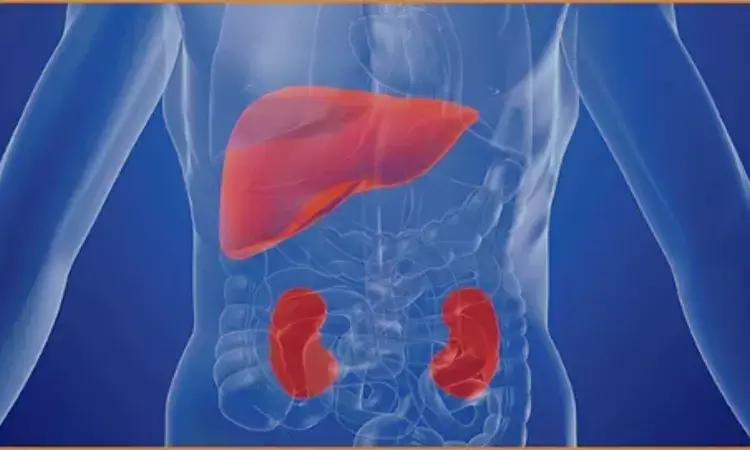- Home
- Medical news & Guidelines
- Anesthesiology
- Cardiology and CTVS
- Critical Care
- Dentistry
- Dermatology
- Diabetes and Endocrinology
- ENT
- Gastroenterology
- Medicine
- Nephrology
- Neurology
- Obstretics-Gynaecology
- Oncology
- Ophthalmology
- Orthopaedics
- Pediatrics-Neonatology
- Psychiatry
- Pulmonology
- Radiology
- Surgery
- Urology
- Laboratory Medicine
- Diet
- Nursing
- Paramedical
- Physiotherapy
- Health news
- Fact Check
- Bone Health Fact Check
- Brain Health Fact Check
- Cancer Related Fact Check
- Child Care Fact Check
- Dental and oral health fact check
- Diabetes and metabolic health fact check
- Diet and Nutrition Fact Check
- Eye and ENT Care Fact Check
- Fitness fact check
- Gut health fact check
- Heart health fact check
- Kidney health fact check
- Medical education fact check
- Men's health fact check
- Respiratory fact check
- Skin and hair care fact check
- Vaccine and Immunization fact check
- Women's health fact check
- AYUSH
- State News
- Andaman and Nicobar Islands
- Andhra Pradesh
- Arunachal Pradesh
- Assam
- Bihar
- Chandigarh
- Chattisgarh
- Dadra and Nagar Haveli
- Daman and Diu
- Delhi
- Goa
- Gujarat
- Haryana
- Himachal Pradesh
- Jammu & Kashmir
- Jharkhand
- Karnataka
- Kerala
- Ladakh
- Lakshadweep
- Madhya Pradesh
- Maharashtra
- Manipur
- Meghalaya
- Mizoram
- Nagaland
- Odisha
- Puducherry
- Punjab
- Rajasthan
- Sikkim
- Tamil Nadu
- Telangana
- Tripura
- Uttar Pradesh
- Uttrakhand
- West Bengal
- Medical Education
- Industry
Central Obesity Linked to Higher Risk of Colorectal Adenoma and High-Risk Adenoma in MAFLD Patients: Study

China: A recent study has unveiled a significant correlation between central obesity and an elevated risk of colorectal adenoma and high-risk adenoma in individuals diagnosed with Metabolic Dysfunction-Associated Fatty Liver Disease (MAFLD). The findings, published in the renowned medical journal BMC Gastroenterology, shed light on the intricate interplay between metabolic disorders and colorectal health.
The study stated that MAFLD and central obesity are independently associated with colorectal adenoma development. MAFLD with central obesity is linked with an increased risk of colorectal adenoma and high-risk adenoma.
MAFLD, previously known as non-alcoholic fatty liver disease (NAFLD), is a burgeoning health concern globally, characterized by fat accumulation in the liver, often accompanied by obesity, insulin resistance, and other metabolic abnormalities. While its association with liver-related complications is well-established, researchers have been increasingly delving into its potential ramifications on other organs, including the colon.
Jingfang Xiong, Department of Geriatrics, Hangzhou Red Cross Hospital, Hangzhou City, Zhejiang Province, China, and colleagues aimed to analyze the risk factors associated with colorectal adenoma and to investigate the associations of MAFLD with obesity, colorectal adenoma, and high-risk adenoma.
For this purpose, the research team enrolled 1395 subjects and were divided according to the inclusion and exclusion criteria into a colorectal adenoma group (593 subjects) and a control group (802 subjects). The chi-square test was deployed to compare the characteristics of patients in the colorectal adenoma group and the control group. Univariate and multivariate logistic analyses were used to analyze independent risk factors and associations with different subtypes of MAFLD. They also compared colorectal adenoma characteristics and the proportion of patients with high-risk colorectal adenoma.
The study led to the following findings:
- High-density lipoprotein (HDL-C) was significantly lower in patients in the colorectal adenoma group than in those in the control group.
- Logistic regression analysis revealed that age, obesity status, central obesity status, hypertension status, fatty liver status, diabetes status, smoking history, waist circumference, BMI, triglyceride level, HDL-C level, fasting blood glucose level, and degree of hepatic steatosis were all independent risk factors for colorectal adenoma.
- MAFLD was associated with a significantly increased risk of colorectal adenoma in patients with central obesity.
- Obesity, central obesity, diabetes, fatty liver, and degree of hepatic steatosis were all shown to be independent risk factors for high-risk colorectal adenoma.
- A greater proportion of MAFLD patients with central obesity than those without central obesity had high-risk colorectal adenoma.
The findings showed that MAFLD is independently associated with colorectal adenoma development. Patients with MAFLD combined with central obesity have a greater risk of developing high-risk colorectal adenomas.
"MAFLD combined with central obesity can be used to screen high-risk patients with colorectal adenoma or high-risk adenomas initially and recommend targeted colonoscopy for high-risk patients, which can improve the screening efficiency of colonoscopy and optimize the allocation of medical resources," the researchers wrote.
They noted the importance of early screening for colorectal adenoma and high-risk adenomas in high-risk populations, followed by early prediction, detection, and treatment of colorectal adenomatous polyps, to reduce the incidence and mortality of CRC.
Reference:
Xiong, Jingfang, et al. "MAFLD With Central Obesity Is Associated With Increased Risk of Colorectal Adenoma and High-risk Adenoma." BMC Gastroenterology, vol. 24, no. 1, 2024, p. 138.
Dr Kamal Kant Kohli-MBBS, DTCD- a chest specialist with more than 30 years of practice and a flair for writing clinical articles, Dr Kamal Kant Kohli joined Medical Dialogues as a Chief Editor of Medical News. Besides writing articles, as an editor, he proofreads and verifies all the medical content published on Medical Dialogues including those coming from journals, studies,medical conferences,guidelines etc. Email: drkohli@medicaldialogues.in. Contact no. 011-43720751


